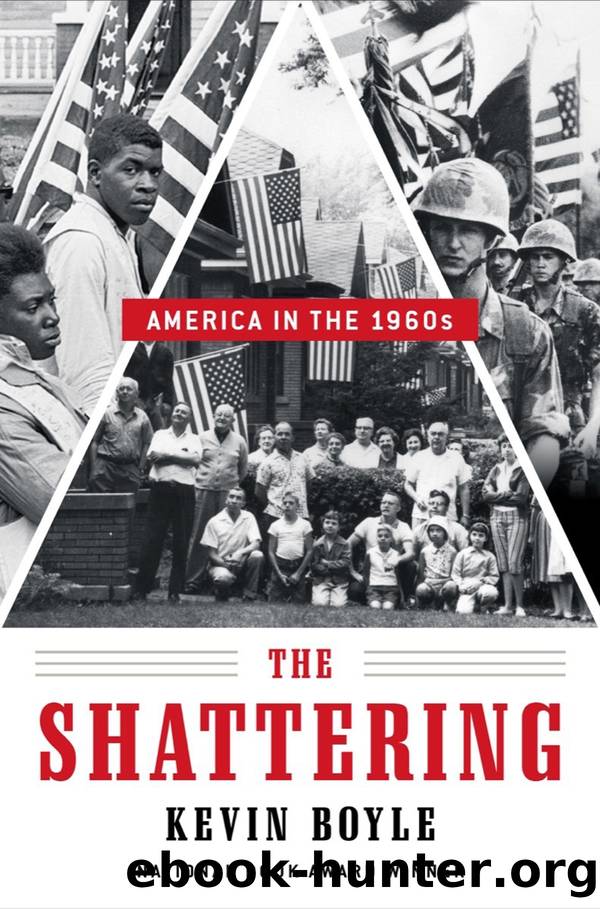The Shattering by Kevin Boyle

Author:Kevin Boyle [Boyle, Kevin]
Language: eng
Format: epub
Published: 2021-10-08T00:00:00+00:00
The Unheard
IN THE AUTUMN of 1966 Stokely Carmichael seemed to be everywhere. He appeared in the rarified pages of the New York Review of Books to explain Black Power to the intelligentsia, on NBCâs Meet the Press to reach the nationâs power brokers, and in front of Harlemâs P.S. 201 to support local demands for community control of the cityâs schools. He lectured to ten thousand students at Berkeley, though the Republican candidate for governor, Ronald Reagan, asked to him to stay away, and to an overflow crowd at Yale. He crisscrossed the countryâfrom Washington, DC, to San Francisco, Oakland to Detroitâto meet with Black activists; packed church halls in Columbus and Dayton, a lyceum in Boston, and a public park in Watts for a rally the city refused to sanction. In almost every venue he delivered a message of uncompromising militancy. âWe are tired of trying to explain to white people that weâre not going to hurt them,â he told the crowd at Berkeley. âWe are concerned with getting the things we want, the things that we have to have to be able to function. . . . The question is, will white people overcome their racism and allow for that to happen in this country? If that does not happen, brothers and sisters, we have no choice but to say very clearly, âMove over, or weâre going to move over you.ââ26 Twice he was arrested for inciting riots.
Most African Americans werenât impressed. Only 18 percent of those polled in December 1966 thought Carmichael was helping to advance civil rights, a figure that placed him at the bottom of a long list of Black activists, barely above Elijah Muhammad. For a portion of the African American Left, though, Carmichaelâs politics were electrifying. By the end of the year cadres of young radicals in New York, Newark, Philadelphia, and Los Angeles had created political parties inspired by his Lowndes County campaign, as had two San Franciscoâarea militants, twenty-four-year-old Huey Newton and thirty-year-old Bobby Seale, who in October launched the Black Panther Party for Self-Defense in Oakland, across the bay from the Haight.
Beyond a few friends and colleagues, the party had no members. So Newton and Seale set to organizing, drawing not on the SNCC style of grassroots mobilization that had inspired Carmichael but on the power of self-presentation. They pieced together a uniform that combined an urban look of black pants, a crisp blue shirt, and a black leather jacket with the black beret favored by Latin American revolutionaries. Then they assembled a cache of weapons, loaded them into their cars, and established neighborhood patrols meant to protect Oaklandâs African Americans from the cityâs overwhelmingly white police force, an act of bravado made possible by a loophole in California law that allowed citizens to carry loaded guns as long as they werenât concealed. The inevitable confrontations with rattled cops brought in a fistful of recruits and a good deal of admiration. But the Panthers didnât have their breakthrough until the state assemblyman from Oaklandâs white suburbs introduced a bill to close the loophole.
Download
This site does not store any files on its server. We only index and link to content provided by other sites. Please contact the content providers to delete copyright contents if any and email us, we'll remove relevant links or contents immediately.
How to Be a Bawse: A Guide to Conquering Life by Lilly Singh(6693)
Spare by Prince Harry The Duke of Sussex(4196)
Millionaire: The Philanderer, Gambler, and Duelist Who Invented Modern Finance by Janet Gleeson(3569)
Harry Potter 02 & The Chamber Of Secrets (Illustrated) by J.K. Rowling(3292)
Urban Outlaw by Magnus Walker(2950)
The Heroin Diaries by Nikki Sixx(2932)
Never by Ken Follett(2880)
Japanese Design by Patricia J. Graham(2556)
The Club by A.L. Brooks(2360)
The Man Who Died Twice by Richard Osman(2299)
Machine Learning at Scale with H2O by Gregory Keys | David Whiting(2291)
Stacked Decks by The Rotenberg Collection(2270)
Harry Potter and the Deathly Hallows (7) by J.K. Rowling(2215)
Fairy Tale by Stephen King(2069)
Will by Will Smith(2042)
Churchill by Paul Johnson(2012)
Harry Potter and the Prisoner of Azkaban (Book 3) by J. K. Rowling(1972)
The Chimp Paradox by Peters Dr Steve(1861)
The 7 Habits of Highly Effective People: Powerful Lessons in Personal Change (25th Anniversary Edition) by Covey Stephen R(1836)
